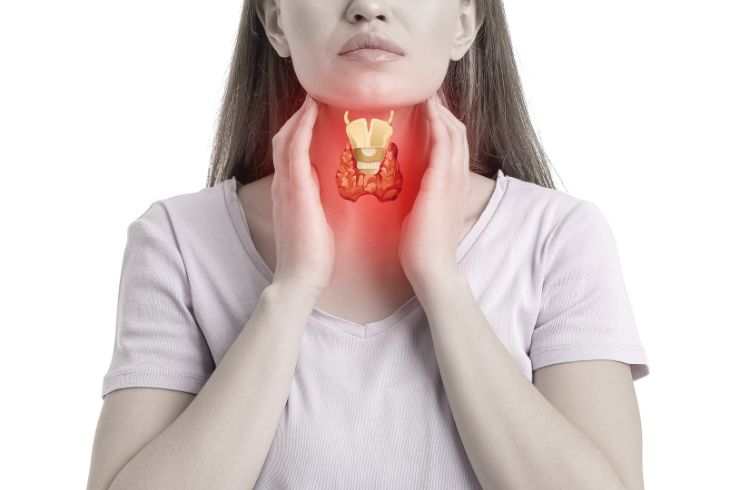Thyroid Disorders

Thyroid disorders are conditions that affect the thyroid gland, a small butterfly-shaped gland located at the base of the neck. The thyroid gland produces hormones that regulate various bodily functions, including metabolism, energy levels, and body temperature. Disruptions in thyroid function can lead to a range of health issues.
Common Thyroid Disorders
Hypothyroidism
- Overview: This condition occurs when the thyroid gland does not produce enough thyroid hormones, leading to a slowed metabolism.
- Symptoms: Fatigue, weight gain, cold intolerance, dry skin, hair loss, constipation, and depression.
- Management: Typically managed with synthetic thyroid hormone replacement therapy, such as levothyroxine. Regular monitoring of thyroid hormone levels is required to adjust medication dosages.
Hyperthyroidism
- Overview: Hyperthyroidism is characterized by an overactive thyroid gland that produces excess thyroid hormones, speeding up metabolism.
- Symptoms: Weight loss, rapid heartbeat, increased appetite, nervousness, heat intolerance, excessive sweating, and frequent bowel movements.
- Management: Treatment options include antithyroid medications, radioactive iodine therapy, or thyroid surgery. Medications help reduce hormone production, while radioactive iodine and surgery aim to remove or destroy overactive thyroid tissue.
Hashimoto’s Thyroiditis
- Overview: An autoimmune disorder where the immune system attacks the thyroid gland, leading to hypothyroidism.
- Symptoms: Similar to hypothyroidism, including fatigue, weight gain, and cold intolerance.
- Management: Treated with thyroid hormone replacement therapy. Regular monitoring is important to ensure appropriate hormone levels.
Graves’ Disease
- Overview: An autoimmune disorder that causes hyperthyroidism. The immune system produces antibodies that stimulate the thyroid gland to overproduce hormones.
- Symptoms: Symptoms of hyperthyroidism plus possible bulging eyes (exophthalmos) and swelling in the neck (goiter).
- Management: Treatment includes antithyroid medications, radioactive iodine therapy, and sometimes surgery. Eye symptoms may require additional treatments.
Thyroid Nodules
- Overview: Lumps or growths in the thyroid gland, which can be benign or, in rare cases, cancerous.
- Symptoms: Often asymptomatic but may cause a visible lump in the neck, difficulty swallowing, or hoarseness if large.
- Management: Evaluation typically involves ultrasound and sometimes biopsy. Treatment depends on the type and characteristics of the nodule, ranging from regular monitoring to surgical removal.
Thyroid Cancer
- Overview: A rare form of cancer that develops in the thyroid gland. It can manifest as a thyroid nodule with potential spread to nearby lymph nodes.
- Symptoms: A lump in the neck, changes in voice, difficulty swallowing, or swollen lymph nodes.
- Management: Typically involves surgery to remove the affected part of the thyroid, followed by possible radioactive iodine therapy and hormone replacement therapy.
Diagnosis and Management
Diagnosis: Thyroid disorders are diagnosed through a combination of medical history, physical examination, blood tests to measure thyroid hormone levels (TSH, T3, T4), and imaging studies such as ultrasound or thyroid scans.
Management: Treatment varies based on the specific thyroid disorder and may include medication, lifestyle changes, or surgery. Regular follow-up with healthcare providers is essential for monitoring and managing the condition.
Lifestyle Considerations: Maintaining a balanced diet, managing stress, and regular exercise can support overall thyroid health and improve symptoms.

Thyroid Disorders
Thyroid disorders affect the thyroid gland, a small butterfly-shaped gland located in the neck that produces hormones essential for regulating metabolism, growth, and development. These disorders can disrupt hormone production, leading to a range of symptoms and health complications.
Hypothyroidism: This occurs when the thyroid gland doesn’t produce enough thyroid hormones. Common symptoms include fatigue, weight gain, cold intolerance, dry skin, and hair loss. Hypothyroidism can be caused by autoimmune diseases like Hashimoto’s thyroiditis, thyroid surgery, radiation therapy, or certain medications.
Hyperthyroidism: In contrast, hyperthyroidism is characterized by excessive production of thyroid hormones. Symptoms may include weight loss, increased heart rate, nervousness, tremors, sweating, and heat intolerance. Graves’ disease, an autoimmune disorder, is the most common cause of hyperthyroidism.
Thyroid Nodules: These are lumps or growths in the thyroid gland, which may be benign (non-cancerous) or, in rare cases, cancerous. Thyroid nodules can sometimes cause symptoms such as difficulty swallowing, hoarseness, or visible swelling in the neck.
Thyroid Cancer: Although less common than other thyroid disorders, thyroid cancer can develop from abnormal thyroid cells. It often presents as a lump or swelling in the neck and may require surgery, radiation therapy, or other treatments.
Diagnosing thyroid disorders typically involves a combination of blood tests to measure thyroid hormone levels, imaging tests such as ultrasound to assess the size and structure of the thyroid gland, and sometimes fine-needle aspiration biopsy to evaluate thyroid nodules for cancerous cells.
Management of Thyroid Disorders:
Treatment options depend on the specific thyroid disorder and its severity:
Hypothyroidism: Typically managed with synthetic thyroid hormone replacement therapy to restore hormone levels to normal.
Hyperthyroidism: Treatments may include medications to reduce hormone production, radioactive iodine therapy to destroy overactive thyroid cells, or surgery to remove part or all of the thyroid gland.
Thyroid Nodules and Cancer: Treatment may involve close monitoring, thyroid hormone suppression therapy, radioactive iodine therapy, surgery, or a combination of these approaches depending on the diagnosis.
